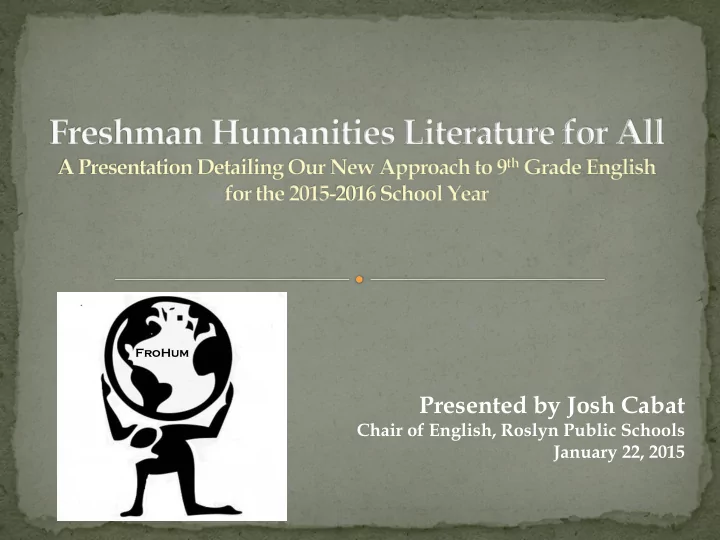

FroHum Presented by Josh Cabat Chair of English, Roslyn Public Schools January 22, 2015
The Common Core State Standards demand a great deal more rigor. The Common Core-based Regents exam is completely different from the Regents exams we and our children have known. It features three parts: Text-based multiple choice inference questions from difficult non-fiction, fiction and poetry excerpts A synthesis essay, where students are given five original-source documents and are asked to draw a conclusion which they must support with textual evidence in an essay A rhetorical analysis, where they are given a long piece of text (i.e. JFK’s inaugural address. They must identify the argument being made and describe the rhetorical strategies the author uses to forward that argument Notice what’s missing: the Critical Lens and any reference to literature that students have read in school!
…as well it should, because it is the exact same format as the AP Language and Composition exam, with somewhat easier tasks It also reflects the kind of work they will need to do on the SAT exam This is not a coincidence. The designers of the Common Core and the College Board have worked together to ensure that at all levels, students have progressed towards achieving college and career readiness based on the Standards.
What we’re doing now works well for the old standards. But even in Honors classes, the rigor of the material is not up to what the Common Core demands.
The first method would be what many districts statewide are doing: to focus intensely on test preparation, perhaps via the modules that the state has up on their website… Or, we change our curriculum so that it features lots of close reading of shorter, more difficult literature and the non-fiction readings demanded by the Core are already baked in.
FroHum
• This honors-level course follows the history of world literature from its beginnings through the Enlightenment. • Although we do read some full-length works, like Medea and Romeo and Juliet , the majority of the class is founded upon short excerpts from the texts. As mentioned, many of these texts, from Confucius to excerpts from Mann’s 1491 , are non-fiction. • Connections are made throughout the year not only with history, but with art, music, philosophy and other disciplines. These connections form the groundwork of the critical thinking and reasoning skills demanded by the Core. • FroHum is the class that will help all students “get the jokes.”
Most important, the Freshman Humanities Literature class will be “divorced” from the Social Studies half of the class. (However, since everyone will be taking Global 1, we will be still be able to make the connections to history as we go.) As has worked so well for the past five years in our College Literature program, students of varying ability levels will take the class together. There will be labs for students who may want or need extra help. There will be an even wider variety of assessments, so that students will have many different kinds of opportunities to demonstrate understanding.
In the Middle School, the Literacy Labs are not tied to what’s going on in the classroom in any way. There, the focus is on general reading and writing skills, all with an eye on the ELA exam. The FroHum Literature labs, on the other hand, will be taught by the FroHum teachers and, in a small-group setting, will focus exclusively on pre-teaching and re- teaching the material that is covered in class. The labs will be fluid, and can be scheduled on a semester basis. 10
In 9 th grade, the FroHum Lit labs can take the place of Writing Enrichment, thus freeing up space for electives. Students may then take Writing Enrichment at a later point in their time at RHS. Guidance has confirmed that the FroHum Lit labs will not appear on students’ transcripts. As this program unfolds, we will evaluate to determine whether we want to continue this idea in 10 th grade and beyond In the meantime, WoHum, AmCiv and PigLit will be offered as always to the 10 th -12 th graders. 11
First, it should be noted that we have fewer seminars in this class than in the other Humanities classes. This is done to give us time to ease the 9 th graders into the process. More important, technology has given us new options for seminar participation. We will use the Today’s Meet app, which enables students to blog in real time while a seminar is taking place (the app’s motto is “ Give everyone a voice .”) 12
The vision of FroHum Lit H for All is one that is shared by the entire English department in the High School As with Algebra for All, the teachers will all receive professional development in differentiation in terms of planning and assessment. Most important, the teachers will plan assessments and lessons throughout the year together. This ensures that the material is covered in a timely and effective way. This also, of course, guarantees that the workload will be even from section to section, and that assessments will be consistent.
In my experience with all of the Humanities classes (and I helped create all of them except AmCiv), they have always unofficially been the “honors classes for everyone.” So many students who have taken the Humanities classes over the years have told us that of all the high school courses they took, these were the ones that best prepared them to do the kind of thinking that was needed for success in college and beyond. The Common Core and the new exams are here to stay. If we don’t challenge all of our students while supporting those who need help now , it will be very difficult to catch up to the standards later on.
15
Recommend
More recommend